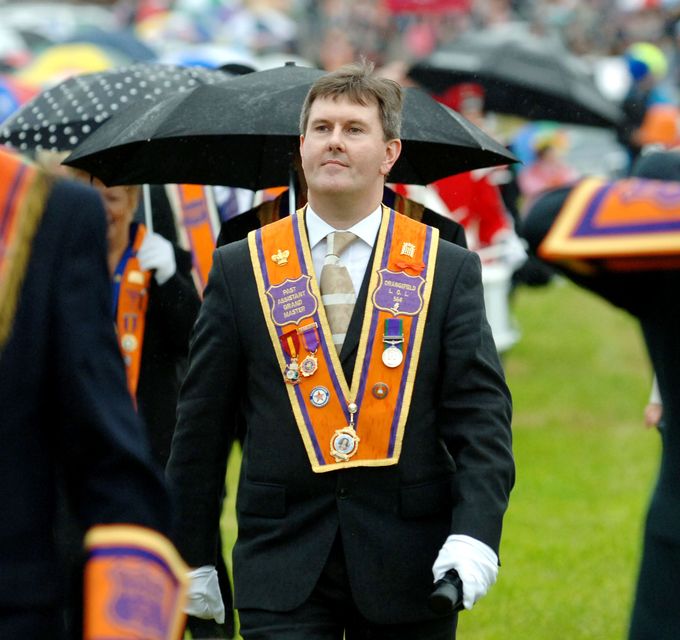Former leader may avoid Westminster as criminal probe proceeds… but he can continue to collect £91,300 salary
There has been intense speculation about his intentions in the wake of the former DUP chief being charged with serious historic sexual offences, including rape.
He immediately tendered his resignation as party leader and his membership was subsequently suspended, effectively making him an independent MP.
He and his wife Lady Eleanor Donaldson were arrested at their Dromore home before 7am on March 28, before being taken to Antrim Custody Suite, where they were charged.
The timeline of the inquiry was confirmed by the PSNI yesterday when they said: “Police first received a report on March 7, 2024.”
There had been speculation that Mr Donaldson would stand down – in a similar move to that when he resigned as DUP leader – sparking a potentially damaging by-election as he fights the charges he faces.
But there has been no indication that he has an intention of relinquishing his seat.
Mr Donaldson is believed to be staying at his London address as part of his bail conditions in advance of a court appearance on April 24, alongside Mrs Donaldson.
Political sources have said Mr Donaldson is likely to stay in place as he maintains his innocence. It had been thought he might step back to concentrate on the fight to clear his name but there is no compunction for him to do so.
The veteran politician asserts he has no case to answer and remains an innocent man until proven otherwise, so there is no reason for him to quit.
Jeffrey Donaldson with his wife, Lady Eleanor
There’s a possibility he will not enter the Westminster estate as the criminal investigation proceeds and this week it was confirmed he has been suspended from his role as a UK trade envoy to Egypt and Cameroon.
So, for at least the coming months, Mr Donaldson can continue collecting his £91,300-a-year salary, even though he is prevented from fully doing his job at Westminster and in his constituency.
The only way an MP can be removed from his seat is if he or she resigns. Even then, there is a considerable process to be gone through before it is confirmed.
The other is by way of a Recall Petition, which requires one in ten constituents signing the document to spark a by-election.
Mr Donaldson’s former party colleague Ian Paisley faced a Recall Petition after he had failed to declare five-star foreign holidays given to him.
A Recall Petition can only be put in place under specific circumstances – conviction of an offence which results in imprisonment, a sentence of more than 12 months which automatically disqualifies someone from being an MP, suspension from the House on the recommendation of the Committee on Standards, and for making misleading parliamentary expenses claims.
None of these conditions applies to Sir Jeffrey.
Alliance’s Sorcha Eastwood is a strong performer
Mr Donaldson retained the Lagan Valley seat with a margin of more than 6,000 votes in 2019, but it is seen as vulnerable with the Alliance Party’s Sorcha Eastwood a strong performer.
Mr Donaldson’s intention to remain as MP for now removes the prospect of the DUP having to fight a by-election in unprecedented circumstances and at a time when the party has been sent reeling by the charges their former leader faces.
However, with a general election likely to be called in the coming months – probably November – the party faces some difficult decisions.
There are no obvious candidates. The constituency’s two DUP MLAs – Paul Givan and Emma Little-Pengelley – have ministerial jobs. Edwin Poots, who moved from Lagan Valley to South Belfast, has been happily installed as Assembly Speaker.
Technically, it is not inconceivable that Sir Jeffrey will put his name forward. He is an innocent man and therefore entitled to run, but whether he could count on the support of political backers is a major doubt.
With a criminal trial not likely before 2025, he may feel his reputation as an MP of 26 years’ standing and with a 40-year career in frontline politics may be enough to get him over the line.
There is some precedent. Tory MP Andrew Rossindell returned to the benches in February after a two-year police investigation exonerated him of alleged sex offences.
For its part, the DUP has tried to quieten the chatter around their former leader. Party members have been urged not to contribute to the social media debate around the controversy.
Jeffrey Donaldson at an Orange Order parade
Interim leader Gavin Robinson has been keen to focus minds on the job at hand. He said that the week since Mr Donaldson’s arrest and charge had been extremely difficult and, in the leader’s weekly message to party members, he urged people to stay strong.
He accused opponents of the restoration of Stormont of seeking to deliver “a wreckers’ charter” that would weaken and divide unionism.
Mr Robinson reaffirmed his party’s commitment to devolution and insisted they will not be taking “a backward step” on his watch, saying the Executive and Assembly were “in the best interests of Northern Ireland”.
He attacked critics “on the margins of the unionist cause”, warning their actions could lead to reduced representation for unionism at Westminster and a propaganda boost for Sinn Féin.
His comments came as the TUV announced plans for a major anti-Protocol rally in Co Down later this month.
He said there was a “unity of purpose” in the DUP to deliver for people and “promote and strengthen Northern Ireland’s place within the United Kingdom”.
“That has not changed, nor will it under my leadership,” he told members.
Mr Robinson said recent events “have been profoundly shocking and my thoughts remain with those who are suffering”.
“The DUP is a party that supports devolution and we make no apology for that,” he said.
“Since early February, we have seen the return of local government where decisions have been taken in the best interests of everyone in Northern Ireland.
“However, there is much more to do, and with the current budget restraints we must act sensibly and honestly as we tackle the long-term challenges ahead.
“The restoration of the Executive and Assembly is in the best interests of Northern Ireland and time will prove that a prosperous Northern Ireland – one that provides opportunity for everyone everywhere – will lead to a stronger Northern Ireland at ease with itself.
“This is a powerful line of defence against those who would promote the fantasy and economic illiteracy of a so-called united Ireland.”
Mr Robinson conceded the so-called Donaldson Deal that brought about the restoration of power-sharing was far from perfect but had secured significant guarantees for Northern Ireland’s constitutional position, stating: “Problems still exist and I will always be open and honest about that.”
But he added: “I am not in the business of taking a backward step or talking down what we have achieved.”
The DUP’s most outspoken detractor, TUV chief Jim Allister, this weekend renewed his attack, claiming the DUP had accepted the Protocol.
He accused the DUP of engaging in “a sham fight” over post-Brexit trading arrangements.
Mr Allister, whose party last month agreed a link-up with Reform UK ahead of the general election, said that part of the “deceptive salesmanship” of the “tainted Donaldson Deal” was the pretence that the party was still fighting to secure concessions.
“Like the patently false claims that the Irish Sea border was gone with ‘zero checks, zero paperwork’, the claim of ongoing demands is equally false,” he added.
“The sad truth is that the DUP, once it gave up the only leverage it had – namely, the Stormont Executive boycott – at the same time gave up resisting the Protocol and metamorphosed into Protocol implementers.
“Henceforth, the DUP’s fight is a sham fight, just like the Donaldson surrender deal which changed not one word of the Protocol nor dis-applied one syllable of EU law.
“The claims of Sir Jeffrey, now repeated by the continuity leadership, that more would be obtained mirrors and adopts the UUP nonsense of fighting the Protocol from within an Assembly with no power or inclination to change one word of the Union-dismantling Protocol.”






















